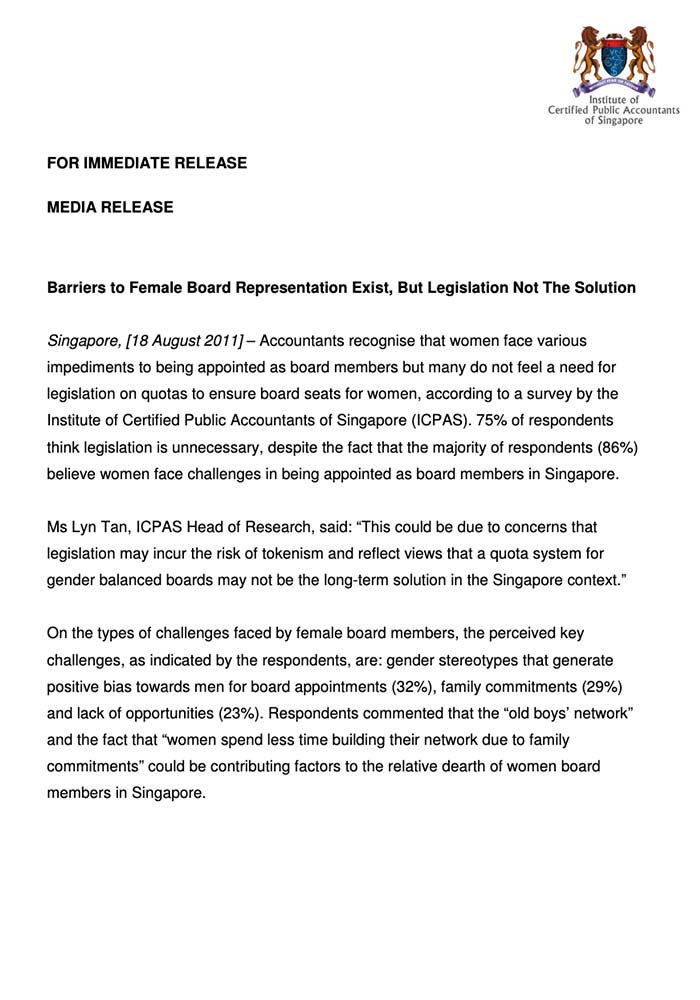MEDIA RELEASE – BARRIERS TO FEMALE BOARD REPRESENTATION EXIST, BUT LEGISLATION NOT THE SOLUTION
Accountants recognise that women face various impediments to being appointed as board members but many do not feel a need for legislation on quotas to ensure board seats for women, according to a survey by the Institute of Certified Public Accountants of Singapore (ICPAS).
75% of respondents think legislation is unnecessary, despite the fact that the majority of respondents (86%) believe women face challenges in being appointed as board members in Singapore.
Ms Lyn Tan, ICPAS Head of Research, said: “This could be due to concerns that legislation may incur the risk of tokenism and reflect views that a quota system for gender balanced boards may not be the long-term solution in the Singapore context.”
On the types of challenges faced by female board members, the perceived key challenges, as indicated by the respondents, are: gender stereotypes that generate positive bias towards men for board appointments (32%), family commitments (29%) and lack of opportunities (23%). Respondents commented that the “old boys’ network” and the fact that “women spend less time building their network due to family commitments” could be contributing factors to the relative dearth of women board members in Singapore.
In Asia Pacific, it was reported that boards with three or more female directors are rare and boards with three or more female independent directors were almost non-existent.1 In Singapore, the number of women on boards of directors remains low as indicated in the NUS Business School research that women made up 6.8% of all boardroom positions in listed companies in Singapore in 20102. This is despite increasing emphasis on companies in the Asia Pacific to include more female leaders at the senior level.
When polled on the reasonable quota of women representatives on boards, more than half viewed 11% to 30% as being reasonable. In contrast, many European countries are now looking to emulate Norway’s 40% female quota for the boards of publicly-traded companies.
The profession/skill set (44%) of a board member was perceived as the most important element in board diversity. This was followed by experience (33%) and gender diversity (10%). Interestingly, the group of respondents who perceived gender diversity as the most important element in board diversity indicated no need for legislative quota.
“This may reflect the sentiment that it is not about appointing women directors just for the sake of having women on boards. Rather, the key consideration for boards is how to achieve a competitive edge by tapping on the right mix of skills sets, perspectives and experience,” added Ms Tan.
ICPAS Research launched the Women on Boards Poll with the aim of exploring the views of the CPA Singapore community on the reasons of few women on boards of directors in Singapore. The 291 respondents in this poll were mainly CPAs Singapore from CPA firms (17%), government/public sector (16%), professional services (16%), financial services (14%) and manufacturing (7%).
Summary of Key Findings
- 86% of respondents agreed that there are challenges faced by women in being appointed as directors on board in Singapore, while the remaining 14% disagreed.
- On the types of challenges faced by female board members in Singapore, the respondents indicated stereotype board composition biased towards men (32%), family commitment (29%), lack of opportunities (23%), limited training and mentoring programmes (10%), and inadequate experience (6%).
- Majority of the respondents (75%) said that there was no need to set a quota legislation to ensure board seats in companies for women.
- When asked about a percentage quota for female board members, more than half indicated 11% to 30% as being reasonable.
- According to the respondents, the unique traits that a woman can bring as a board member include an eye for details (33%), awareness of ethics and more values driven (21%), skillfulness in dealing with people (17%), inclusiveness (16%), and effective communication (13%).
- Profession/skill set (44%) is perceived by the respondents as the most important type of board diversity, followed by experience (33%), gender diversity (10%), socio-cultural (8%) and age (5%). The respondents who perceived gender diversity as the most important type of board diversity indicated no need for legislative quota.
– Ends –
1 Demand for Female Directors on Asia Pacific Boards Remains High, but Representation is Still Low, Korn/Ferry International, 7 March 2011
About the Institute of Certified Public Accountants of Singapore
Established in 1963, Institute of Certified Public Accountants of Singapore (ICPAS) is the national accountancy body that develops, supports and enhances the integrity, status and
interests of the profession.
The Certified Public Accountant Singapore (CPA Singapore) is a professional in accountancy, finance and business who has the relevant work experience in addition to a recognised
accountancy qualification. CPAs Singapore serve every corner of the world in every industry. Many of them helm some of the most prominent local and international corporations.
ICPAS accords the CPA Singapore designation. Working closely alongside businesses, ICPAS connects its membership to an unmatched range of information resources, events, professional
development and networking opportunities. Presently, there are more than 24,000 members making their strides in businesses across all industries in Singapore and around the world.
ICPAS’ international outlook and connections are reflected in its membership of regional and international professional organisations like the ASEAN Federation of Accountants (AFA), the
Asia-Oceania Tax Consultants’ Association (AOTCA), the International Federation of Accountants (IFAC) and the International Innovation Network (IIN).
For more information, please visit www.icpas.org.sg
For media enquiries, please contact:
Ms Betsy Tan
Communications Manager
Institute of Certified Public Accountants of Singapore
DID: 6597 5608
HP: 9641 6920
Email: betsy.tan@icpas.org.sg
Or
Ms Orange Tan
Senior Communications Executive
Institute of Certified Public Accountants of Singapore
DID: 6597 5613
HP: 9273 3033
